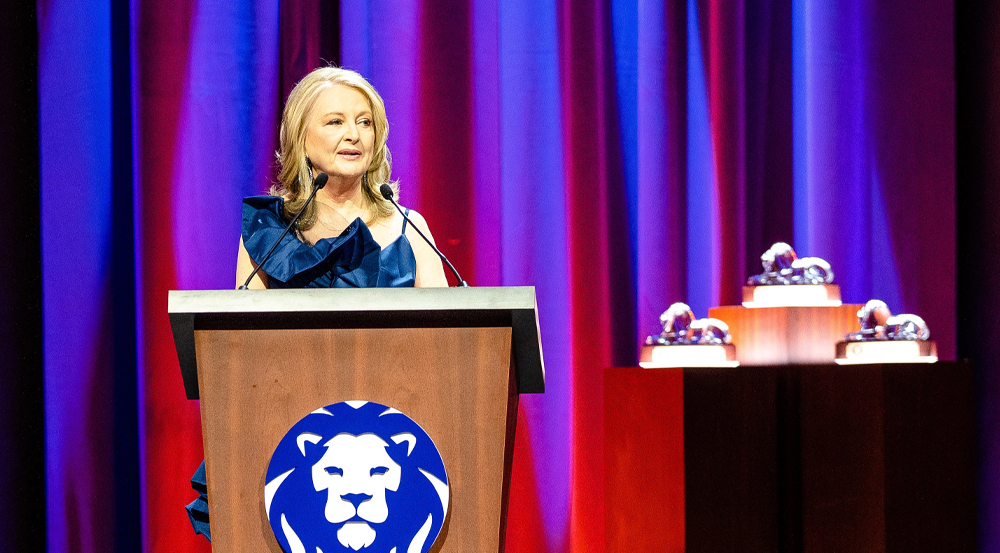Nina Shea helped launch and lead the coalition to adopt the International Religious Freedom Act of 1998. She was appointed by the US House of Representatives to serve as a commissioner on the US Commission on International Religious Freedom seven times from 1999 to 2012. Shea has authored or co-authored three books on religious persecution, frequently testifies before Congress, and has briefed American presidents, secretaries of state, and other officials. Most recently, she met with Pope Francis to discuss China’s persecuted Church.
An excerpt of Mrs. Shea's speech is below. Watch the video of her complete remarks or read the transcript here.
Remarks from the 2023 Bradley Prizes shared with permission of The Lynde and Harry Bradley Foundation.
During the Cold War, Natan Sharansky, a Jewish Refusnik in the Soviet gulag, tapped on his prison cell in Morse code, excited to tell other prisoners the news: President Reagan had called the Soviet Union an “evil empire.” Sharansky was elated, he later explained, because the leader of the Free World made a frankly moral judgment, delegitimizing their oppressors.
Sharansky and other prisoners of conscience were freed thanks largely to relentless American advocacy. Reagan said he viewed religious freedom as the Soviets’ “Achilles’ heel.” Eventually, the empire fell, without a shot fired, due to Reagan’s policy of peace through military and economic strength, and public diplomacy that especially focused on religious freedom and that, yes, delegitimized Soviet communism before the world.
The United States has been the world’s indispensable nation in the defense of religious freedom. This is rooted in America’s dedication to the right at home. The United States recognizes certain “unalienable rights” endowed by our Creator, of which religious freedom is the very first guaranteed in the Constitution’s Bill of Rights. It has been central to our history, traditions, and laws. Think of President George Washington’s unequivocal promise to a Rhode Island synagogue, in 1790: the United States “gives to bigotry no sanction, to persecution no assistance.” These are revolutionary words still. Many countries today persecute their religious minorities.
Our First Amendment’s focus on limiting government power is part of American exceptionalism. It bars laws establishing religion and prohibiting its “free exercise.” Thus, unlike many places, the US does not license religions nor pick and choose among denominations.
Religious freedom in America is not limited to worship or holding beliefs in the secrecy of one’s heart—even North Korea has that. It includes manifesting religion in public. Religious charities run hospitals, schools, and much else; thirty percent of American charitable giving goes to religious organizations.
Religious freedom also includes the rights to convert, criticize, and reject religion. We have the right to educate our children in our faith and morals. Religious objections to other governmental priorities can be accommodated, as seen in recent Supreme Court decisions for Catholic nuns and Sikh soldiers.
Let me cite some examples from abroad showing why America is seen as the shining city on a hill:
If you’re caught praying in North Korea, three generations of your family can be sent to labor camp. If caught with a Bible, you’ll be executed.
In Iran, all women must wear Muslim headscarves in public under penalty of imprisonment or death. In January, Iran sent hit men to Brooklyn to murder Masih Alinejad, a prominent critic of Iran’s hijab law. The FBI thwarted them. In Nigeria, extremists have reportedly slaughtered over 5,000 Christians last year alone and attacked some 18,000 churches since 2009—largely with impunity.
Severe persecutors don’t share our fundamental values and aren’t reliable allies. Secretary of State Pompeo designated China’s persecution of Uyghur Muslims as genocide, and it opened the West’s eyes to the mortal threat the Chinese Communist Party poses to our values and security. China is the modern face of persecution and the greatest threat to religious freedom today. It uses a dense web of regulations and sophisticated tactics. All religious groups are suspect and must register with the party, which controls houses of worship with high tech surveillance cameras that feed into digitized social credit score systems and police computers.


